Husband Of Ex-Detainee Slams UK Govt. Over Iran Hostages
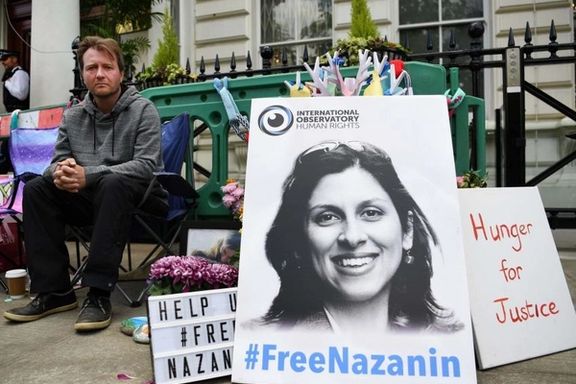
The husband of former Iranian-British hostage, Nazanin Zaghari-Ratcliffe, detained in Iran for several years, has accused the UK government of soft pedaling on Iran’s treatment of hostages.

The husband of former Iranian-British hostage, Nazanin Zaghari-Ratcliffe, detained in Iran for several years, has accused the UK government of soft pedaling on Iran’s treatment of hostages.
Speaking to the Guardian on Thursday, Richard Ratcliffe criticized British officials, saying that they are losing interest in hostages after negative publicity surrounding his wife’s detention has subsided.
“One year on, I do find it upsetting how the government won’t say how many Brits are currently held hostage by Iran, that they tried to imply to parliament this week that states do not take hostages, and that since Nazanin’s case, they have not recognized the torture of any British citizen by a foreign government,” he added.
The Foreign Office minister, David Rutley, told the foreign affairs select committee on Monday that the UK did not believe a state could act as hostage taker, and instead uses the term “arbitrary detention for diplomatic leverage”.
Liam Byrne, a Labour MP said that hostage families needed a single point of contact who had a reporting line to the UK prime minister “to knock the proverbial heads of government together”.
However, the Foreign Office stated, “The UK will never accept our nationals being used as political leverage and we continue to press Iran to end this abhorrent practice.”
Ratcliffe raised his criticism on the first anniversary of the release of Nazanin Zaghari, who had earlier criticized London for the process of her release.
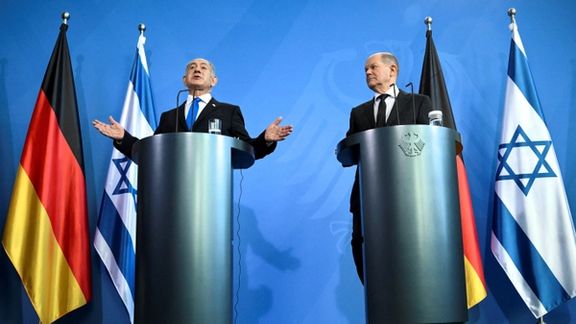
A senior Israeli official has told Iran International that Prime Minister Benjamin Netanyahu's recent visits to Europe is to convey the message that Israel would act alone against Iran if need be.
The official, who spoke on condition of anonymity, said Friday that Netanyahu's meetings with European leaders were aimed at reassuring them that Israel would do whatever it deems necessary against the Islamic Republic’s nuclear program.
“Recent trips to some European countries and meetings with the leaders of these countries are both a message for Europe and a direct message for the Iranian government," the source said, noting that Tehran has "received" this message.
On the backdrop of tensions over his government’s controversial overhaul of Israel’s judicial system, Netanyahu held meetings with Germany's aders, including Chancellor Olaf Scholz and President Frank-Walter Steinmeier, on his one-day trip to Berlin on Thursday where they talked about concerns over Iran’s fast-paced nuclear enrichment.
Israel will "do what it has to do, even alone" in the face of Iran's nuclear threat, the source said, adding that Netanyahu urged Schultz in their meeting to confront Iran with more strength and seriousness.
Moreover, the Israeli official told Iran International that thanks to Mossad operations inside Iran, progress in Tehran’s nuclear program with military potential was pushed back for seven years, but currently Tehran has passed serious red lines.
The official added that Israel and Germany are very close in finalizing a deal for the sale of the Arrow 3 -- or Hetz 3 in Hebrew -- exoatmospheric hypersonic anti-ballistic missile system to Berlin. The system is jointly developed and produced by Israel Aerospace Industries and Boeing under the management of the Israeli Ministry of Defense's "Homa" (rampart) administration and the US Missile Defense Agency.
As he stood with Scholz at the Holocaust memorial Platform 17 in Berlin, Netanyahu appeared to compare Iran with the Nazis, and spoke of the necessity of halting catastrophe in its early stages. “The main lesson we have learned is that when you are faced with such evil, you have to obstruct the evil designs early on to prevent catastrophe,” he said.
Netanyahu has time and again threatened military action against the Islamic Republic’s nuclear program as it enriches uranium closer to weapons-grade levels. On March 9, Netanyahu told Iran International that Tehran is “dangerously moving forward” in its nuclear program, claiming that he returned to the government primarily to make sure that Iran cannot become a nuclear “threshold power.”
However, German officials also criticized Netanyahu for rejecting a compromise proposal by Israeli President Isaac Herzog for overhauling the legal system. Voicing concern about the planned overhaul, Scholz hailed efforts by Israel’s figurehead to seek a “broad basic consensus.”
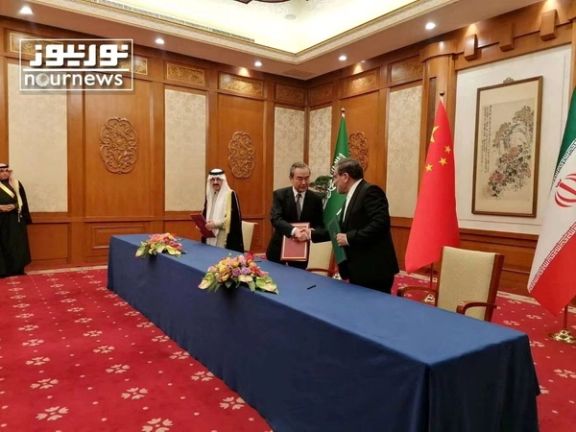
Netanyahu met with Italian premier Giorgia Meloni last week when both both called for bolstering bilateral ties. His meeting with Meloni came just after Iran and Saudi Arabia announced a resumption of diplomatic ties, a development that Netanyahu was widely criticized at home for failing to prevent.
Head of Israel’s National Security Council Tzachi Hanegbi told Iran International earlier in the week that the rapprochement between Tehran and Riyadh has nothing to do with Iran’s nuclear program. He described the agreement as a way to prevent the Islamic Republic from arming Yemen’s Houthis against the Saudi-led coalition, noting that Riyadh itself is worried about Tehran’s nuclear enrichment at weapons-grade.
On March 13, Iranian diplomat Kourosh Ahmadi said in an interview with Etemad Online that Europe and the United States probably welcome the breakthrough because it makes it less likely for Iran to disrupt the flow of oil from the Persian Gulf in case of an Israeli attack on its nuclear installations. He added that the agreement between Tehran and Riyadh will lead to a reduction in urgency for the US to supply arms to Persian Gulf Arab states as they would be now less concerned about possible threats from Iran.
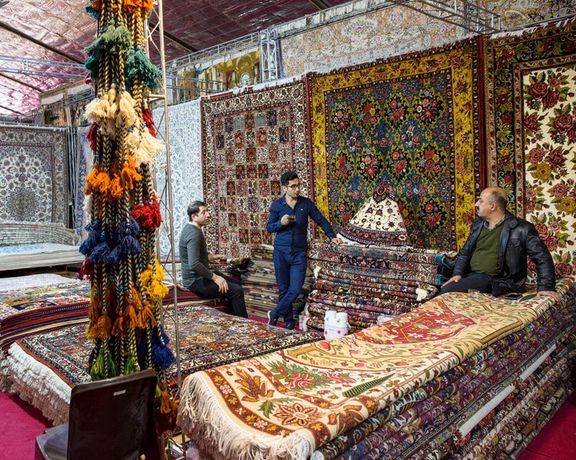
Exports of one of Iran’s most famous products, the Persian carpet, are at its lowest levels in 24 years.
Official customs reports say the weight value of Iran's handmade carpet exports in the first 11 months of the current Iranian year dropped from 3,800 to 2,900, a 24% decrease in one year alone.
But the decline has been a long time in the making. Persian carpets generated over two billion dollars for Iran in 1994, but sold only $69 million in 2019, bringing in a mere two million dollars in the second quarter of 2020.
Several factors including the challenges to global logistics chains, rising cost of products and the pandemic, account for the major drop in one of the country’s most prized national treasures, famed around the world for centuries. Sanctions have dealt local industries a fatal blow.
Faisal Mardasi, Head of Iran's National Carpet Center, told local media: “Our Indian, Chinese, Afghan, Pakistani and Turkish competitors have entered the global carpet markets by copying Iranian designs.”
Meanwhile, as purchasing power has sharply decreased and the price of hand-woven carpets soared, people are more willing to buy Afghan samples instead of Iranian.
In Iran's rural economy, carpets have been one of the country's most crucial employment opportunities for many years, providing a livelihood for millions of families.
A high value-added commodity with production that does not require large investments, it means the products can create both employment and export capacity.
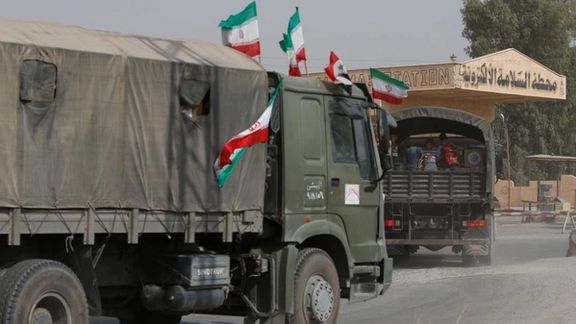
The Islamic Republic has opened an office in Syria’s northeastern Hasakah province to recruit young locals to join its proxies.
Offering vulnerable young men a monthly salary of $200, The Syrian Observatory for Human Rights reported that the Islamic Republic is on a new drive to recruit militants from one of the region’s poorest countries.
It claimed that 80 men are working voluntarily in the office, part of the Islamic Republic's efforts to expand its military and political influence in Syria.
Reports from the rights group claim that in November, the Lebanese proxy Hezbollah, Iran’s most powerful regional militia, destroyed vegetable warehouses in Damascus and turned them into military headquarters of Iran-affiliated proxies.
In December, Asharq Al-Awsat also reported that militants affiliated to the Islamic Republic are seeking to buy land and real estate in the southern suburbs of Damascus with the aim of expanding Iran's influence near the Syrian capital.
The newspaper claimed that there is a renewed campaign to purchase homes and establish new camps in areas adjacent to the zones of influence of Russia while Iran tries to deepen its influence while Russia is preoccupied with its war in Ukraine.
There are also claims that the Iranian militias have confiscated properties from people across other regions of Syria. In 2021 The Observatory reported that the IRGC and its militias have confiscated 10 houses and 30 shops in the city of al-Mayadin in the eastern suburbs of Deir ez-Zor, claiming that their owners are opponents of Bashar al-Assad's government.
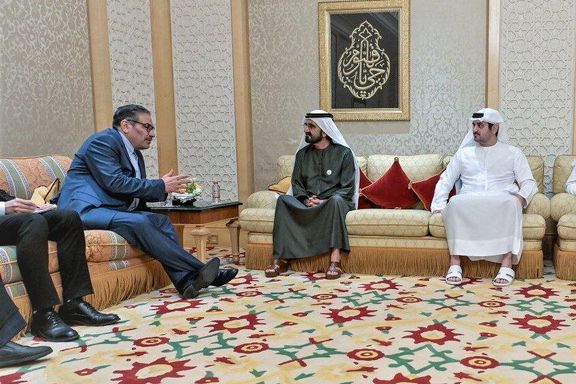
Iran will push forward at rapid speed as it forges better relations with its Arab neighbors following the recent agreement to restore ties with Saudi Arabia, according to the regime.
In a glowing article published Friday, IRNA, the state news agency, portrays the agreement with Saudi Arabia, signed a week ago in Beijing, as a historical event that heralds a new era in the Middle East.
Iran’s national security chief Ali Shamkhani, an old IRGC hand, visited the United Arab Emirates Thursday and met with members of its top leadership. However so far, there is no concrete information about details of the discussions in UAE and Iranian media.
IRNA, however, said the visit shows that once Tehran and Riyadh embark on rapprochement, Saudi allies would follow and “foreign influence” will be reduced in the region, implicitly referring to the United States.
Shamkhani met with UAE President Sheikh Mohammed bin Rashid and ruler of Dubai and other top officials Thursday. “Their talks covered regional and international issues of mutual concern, and the importance of working to support peace and co-operation in the region to enable progress and prosperity for its people,” state news agency Wam reported.
Iranian media have hinted that Shamkhani’s agenda included discussions with the UAE to help Iran overcome some of the impact of US economic sanctions, as the regional trade and banking hub.
Iran has already been using middlemen and contacts in the UAE to facilitate its illicit oil trade and money laundering efforts. But any official commitment by the UAE is hard to imagine given the potential violation of US sanctions.
Reuters quoted two unnamed Iranian officials Thursday as saying that last September, Iran's Supreme Leader Ali Khamenei lost patience with the slow pace of bilateral talks with Riyadh and summoned his team to discuss ways to accelerate the process, which led to China's involvement.
This would mean a complete about-face by Khamenei whose zealous followers attacked the Saudi embassy in Tehran in January 2016, an incident that led Riyadh to cut diplomatic ties.
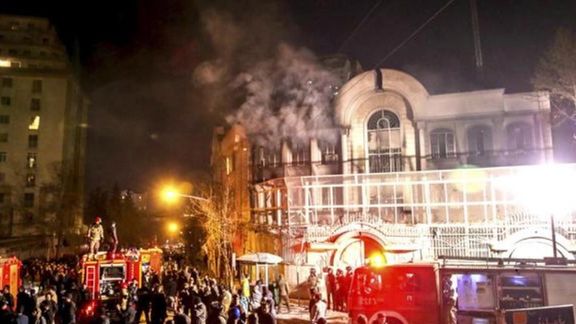
Khamenei and other senior clerics have over the years repeatedly castigated the Saudi ruling family as lackeys of the United States who were harming the interests of Muslims. Khamenei has so far been silent on the agreement with Riyadh, but he is scheduled to address the nation next Tuesday on the Iranian New Year, Nowruz.
Other reports have indicated a more forceful Chinese role in persuading Tehran to offer guarantees to Riyadh to facilitate normalization.
The Wall Street Journal reported Friday that Tehran has pledged not to send arms to Yemen’s Houthis who have been fighting Saudi-led forces for nearly a decade, quoting US and Saudi officials.
Yemen is clearly the most immediate issue the Saudis want to see resolved, as without Iran’s military backing, the Houthis have to show flexibility and perhaps conclude a peace agreement in the war-torn country.
An interesting part of the report by IRNA is the reference to popular protests that erupted last September after the death of Mahsa Amini in ‘hijab police’ custody. IRNA says that good relations with neighbors will help derail enemy plans to destabilize the Islamic Republic, repeating accusations that protests were part of a Western conspiracy.
It also emphasizes the need for a “rational” foreign policy, a term so far used by critics of the hardliners in full control of the government. It says the deal with Saudi Arabia and Shamkhani’s trip to the UAE can help calm the domestic political scene. These comments clearly show how far the regime has been shaken by the popular protests and how extending a hand to its Arab neighbors is now more a necessity than choice.
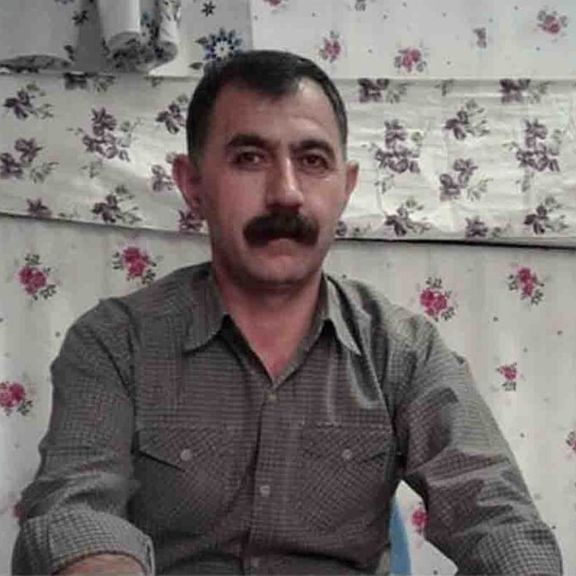
A Kurdish political prisoner has been executed in Orumiyeh’s (Urmia) central prison.
According to rights group Hengaw, Mohyeddin Ebrahimi from Oshnavieh in Iran’s West Azarbaijan province, was killed in the early hours of Friday.
In a cruel twist, his family had been informed that his execution had been suspended but just hours later, were told he had been executed.
In recent days, the rights group expressed concern over the transfer of Ebrahimi to solitary confinement, protesters gathering outside the prison to demand the overturning of the verdict sentencing him to death.
In a brutal journey, Ebrahimi, 42, a member of the Kurdistan Democratic Party, was first arrested by security forces in 2009 on charges of cooperating with one of the Kurdish opposition parties.
He was sentenced to 14 months in Urmia Central Prison. However, he was arrested after being shot by IRGC forces in Bimzarata headquarters in Oshnavieh in November 2017 and has been in prison ever since.
In August 2018, he was finally sentenced to death, one of a growing number of Kurds suffering brutal crackdowns by the regime.
In recent months, Iran’s clerical rulers have stepped up suppression of persistent anti-government protests in the country's Kurdish region, home to the majority of Iran’s 10 million Kurds.
The regime has deployed troops and killed several demonstrators since protests erupted following the death in police custody of Kurdish Mahsa Amini, in addition to others already in the region’s brutal prisons.
Also Friday, Shirzad Ahmadinejad died in the same prison, after authorities failed to give him medical attention.